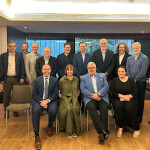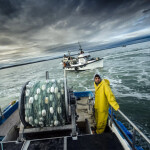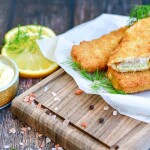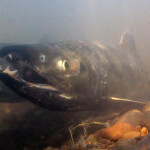A challenge was put to a panel of five distinguished speakers at a recent “Come Dine with the Future” event that took place at the National Museum of Wales in Cardiff.
The question they faced: “What food will be on the menu in 2050?”
Their answer, perhaps surprisingly: a lot of seafood. Specifically, salmon, mussels, lobster, crayfish, tilapia and seaweed.
Organized by the Sêr Cymru National Research Network for Low Carbon Energy and Environment and the Royal Society of Biology, the event set out to explore the sustainability of our food over the next 30 to 40 years.
Food journalist Diane Fresquez chaired the panel of experts, and asked participants to make up a three-course menu of food they thoughts would be available in the year 2050.
Professor Achim Dobermann, the director of Rothamsted Research, one of the oldest agricultural research institutions in the world, set the scene by discussing food security. The issues Dobermann listed as being most relevant to the world’s future food security included: a rapidly growing world population, worsening climate change, plant and animal disease, inequalities leading to hunger and obesity and global food trade, were particularly relevant to our future food security.
The panel heard that worldwide, 1.3 billion tons of food is wasted every year, while almost one billion people go undernourished and another b illion go hungry. Dobermann said there is a pressing need to feed the world sustainably, given that the global population is expected to rise to 10 billion people by 2066.
Subsequent speakers looked at how we might use the latest scientific techniques and practices such as aquaculture, genetic engineering, insect eating, urban farming and food-sharing to sustainably feed our growing population.
Proposing an entirely marine-based menu, Grant Stentiford, a researcher at the Centre for Environment, Fisheries and Aquaculture Science, championed the increasing importance of aquaculture in our food system and said he believed it would feature heavily in global diets by 2050.
Stentiford’ s menu included off-shore rope-grown mussels poached in nori butter, served with bladderwort sourdough bread, followed by Scottish salmon and Cornish cultured lobster claws, with a desert of blueberry agar jellies. He admitted some assistance from restaurateur and former Master Chef winner Mat Folass, who is also passionate about seafood.
Smoked salmon featured as a starter on Professor Helen Sang’s menu. Sang, from the Roslin Institute at the University of Edinburgh, predicted that genetic modification of fish and meat would eventually become acceptable, with the population understanding that it was necessary in order to improve nutrition, disease resistance and yields of fish, meat and crops.
Sang argued that tremendous advances had already been made to improve salmon fish health and to reduce the amount of marine protein in feed. These gains were expected to continue over the decades to ensure a sustainable future for this farmed fish.
Professor Les Firbank from the University of Leeds included American signal crayfish in his menu, served in a paella. He argued that harvesting this tasty but invasive and fast-growing species would help to keep it under control.
Tom Webster, from GrowUp Urban Farms, suggested insect cakes for his starter, followed by farmed tilapia and vegetables, grown in a ‘zero waste’ system of indoor, aquaponic and vertical-growing technologies.
Webster explained that his fledgling business is committed to feeding people in cities in a way that is positive for communities and the environment. He expects the role of such enterprises to be even more important in the future.
GrowUp Urban Farms has a start-up demonstration project in London, which is successfully producing sustainable fresh fish, salads and herbs year-round. These are finding a ready market, but Webster admits that his future challenges are to up-scale in order to reduce costs.
“We’re changing the way food is grown and distributed in cities and we’re reconnecting people with the story of food from farm to fork. I believe that this format is set to grow and grow,” he said.
The final speaker, Professor Katherine Denby, a plant specialist from the University of York, was the only speaker to eschew seafood. Instead, she spoke about the importance of big data analyses, biodiversity and precision agriculture for future food security of vegetarian menus.
Fresquez, with her mouth watering, regretted that the evening’s menus were only on paper, and suggested that the audience might like to recreate some of the meals at home.
She challenged the audience, who ended the night by voting for their favorite menu items, to consider aspects of costs and feasibility, different farming practices, nutrition and the wider societal impacts of our future food, before voting.
Interestingly, seafood lost the vote, with insect cakes and vegan brownies from Webster winning the starter and desert respectively, and an azolla (aquatic fern) burger from Professor Denby finding most favor for the main course.






